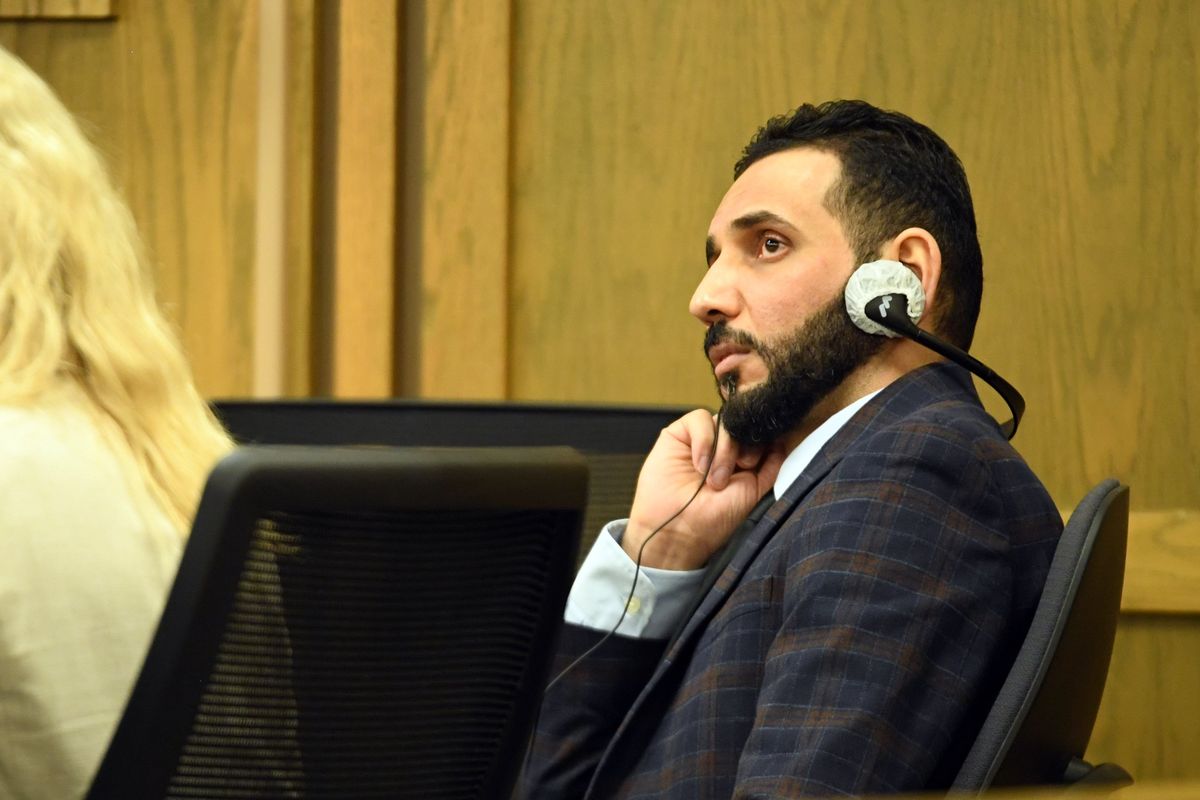Prosecutors say man accused of killing ex-wife argued with her shortly before her death, cell phone evidence ties two together

A 33-year-old Iraqi refugee told police he argued with his ex-wife hours before she was found dead, prosecutors said Wednesday during opening statements in the man’s murder trial.
But he says he didn’t do it.
Yasir Darraji is charged with second-degree murder and harassment-threats to kill related to the 2020 death of his ex-wife Ibtihal Darraji. She was found strangled in her burning car near Thornton Murphy Park on Spokane’s South Hill.
The Darrajis fled Iraq in 2014 with their two children, said prosecutor Andrew White.
They arrived in Spokane hoping to “seek the American dream,” he said.
“Their story, you’re going to find out, is a common one,” White said. “When they got here, they made friends with many members of the Iraqi community in Spokane.”
The couple began to have marital troubles that ended in divorce in 2016. They were relatively amicable at first, White said, sharing custody of their children.
“You’re also going to hear that starting in late 2019 trouble began to emerge between the two of them,” White told the jury.
They had arguments over how Ibtihal Darraji was becoming more “Americanized,” drinking and going out dancing, White said.
“These were things that were seen as unacceptable in their culture,” White said.
Rumors started to circulate in the Iraqi community about Ibtihal Darraji having sex outside of marriage and maybe being pregnant with someone else’s child, White said.
Ibtihal Darraji and a friend, a young woman, confronted one of her ex-husband’s friends about spreading the rumors, White said. That led to a minor scuffle, which Yasir Darraji recorded from nearby, White said.
After the incident, things continued to escalate into early January 2020, White said.
“She contacts him and leaves him a furious voicemail saying she’s not gonna stand for this anymore,” White said. “And the reaction that she gets is something worse than screaming. It’s silence.”
On Jan. 30, 2020, Ibtihal Darraji planned to go pick up her young son and then pick up another friend before going to a friend’s home for dinner, White said. She never arrived at the friend’s house.
Hours later, her body was found in her burning Toyota Prius, White said.
Yasir Darraji told police the pair had a fight over Ibtihal’s perceived drug use, and she left without their son, White said.
The Spokane County Medical Examiner said Ibtihal Darraji had a broken bone in her neck and showed no signs of smoke inhalation, pointing to her being strangled, White recounted.
Prosecutors plan to call an FBI expert to testify that Ibtihal and Yasir Darraji’s cellphones pinged near Yasir Darraji’s apartment. And then she stopped using her phone.
Their phones continued to ping together and moved from Spokane Valley to downtown Spokane and then up onto the South Hill, where Ibtihal’s body was found, White said.
He asked the jury to consider all the evidence prosecutors will present during the coming weeks of trial and then find Yasir Darraji guilty.
Yasir Darraji’s defense attorney, Rob Cossey, reserved his opening argument until after the state presents their case.
One of Ibtihal Darraji’s closest friends, Zainab Jameel, testified through a translator that the two grew extremely close after Ibtihal’s divorce. They spoke almost daily, she said.
Ibtihal Darraji changed after her divorce, Jameel said. Before her divorce, Ibtihal Darraji didn’t drive or have a job, Jameel said. She covered her hair too.
After the divorce, Ibtihal Darraji “became aware,” Jameel said. She stopped covering her hair, got a job, learned how to drive and started attending a Christian church with Jameel.
Ibrihal Darraji also went out for drinks and dancing, Jameel said.
When asked if she joined her friend, Jameel, who is also an Iraqi refugee, declined to answer.
Jameel said there were rumors about Ibtihal Darraji going around the community but wouldn’t share what those rumors were.
“I really can’t speak about such topics,” she said.
The week Ibtihal Darraji was killed, Jameel said her friend was acting differently. She looked pale and was afraid. The two talked daily and saw each other just as often. Ibtihal Darraji would frequently message Jameel she missed her, also something out of the norm, Jameel said.
The night Ibtihal Darraji died, she was supposed to go to Jameel’s house for dinner. When she didn’t show up, Jameel began to worry. The next morning, Jameel said she went to Ibtihal’s apartment to look for her car, then called hospitals and checked to see if her friend was in jail.
In court, Jameel read text messages she sent to Ibtihal Darraji that morning.
“Ibtihal I’m worried about you. What is the issue,” one message read.
Not long after, their mutual friend called to tell Jameel that Ibtihal Darraji was found dead.
Jameel was in shock, she said.
A few days later, Jameel contacted Ibtihal Darraji’s family back in Iraq. That’s when Ibtihal Darraji’s mother forwarded Jameel a voice memo from Yasir Darraji. A portion of that voice memo, in Arabic, was played in court.
A friend of Yasir Darraji’s, Hayder Hussein, testified that he saw Ibtihal Darraji out drinking.
“And this is not part of our culture or traditions,” Hussein said.
It was not part of their culture both as Iraqis and Muslims, he said. When Yasir Darraji found out about it, Hussein said he took him out to cheer him up.
He also testified that shortly after the couple’s divorce, he saw a photo of Ibithal Darraji hanging out romantically with a mutual friend of his and Yasir Darraji’s, which made Yasir Darraji upset.
More friends of Ibtihal Darraji along with her former boss are set to testify Thursday. The trial is scheduled to continue for the next three weeks.